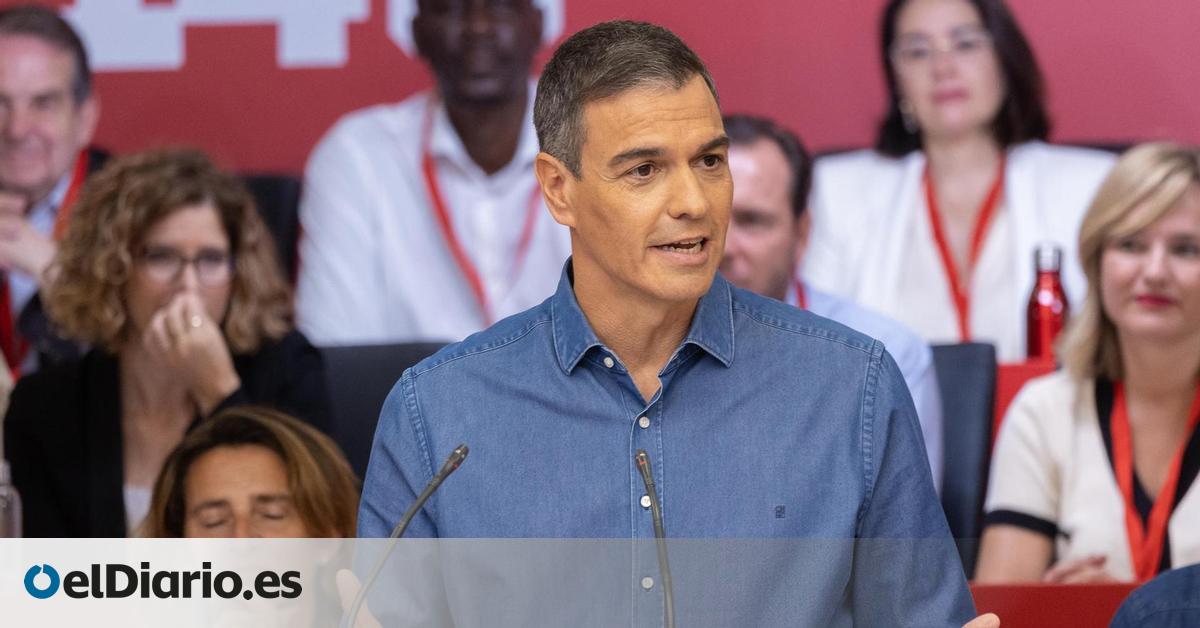
Pedro Sánchez asks for the support of his party to deepen a federal model that grants more capacity for self-government to all the Autonomous Communities. In the midst of an intense internal debate on the impact of the fiscal pact reached in Catalonia and the criticism of several territorial leaders, the President of the Government has assured during the Federal Committee of his party that the reform of the financing model that his Executive will carry out will be beneficial for all the territories because it will serve to deepen the public policies defended by the socialists.
“The real debate is not between territories but between models: those who see public services as rights or those who see them as commodities. And we will always defend that health and education, dependency and pensions are rights that should never be traded,” he said.
Although he has not expressly referred to the content of the investiture agreement between the PSC and ERC, Sánchez has raised a clash of political models between social democracy and the right from the perspective of the welfare state. And he has defended that his party should focus on that to avoid the controversy over the change of model committed to Catalonia.
“Regional funding is an alibi. It is the umpteenth excuse with which they try to hide their neoliberal project,” said the leader of the socialists during his speech, during which he reviewed the figures for the transfer of resources from the State to the Autonomous Communities in the six years of his mandate and specifically pointed out the cuts in public services of PP autonomous governments such as Valencia, Extremadura, Madrid or Aragon.
“Never, in the more than 40 years of existence of the autonomous state, has a Government poured more resources into financing the autonomous communities. So, what is the problem? That some ask with one hand, while with the other they give tax gifts to the richest. What greater lack of solidarity than the fact that there are Communities that, as soon as they receive money from the State, which is the money of all Spaniards, they divert it with their tax gifts to the pockets of those at the top, those who have the most?” he questioned.
“That is their model,” he continued, “to now demand 18 billion euros of European funds from the taxes of the middle and working classes, to give them in the form of tax cuts to a privileged elite. This is how they defend equality between Spaniards!”
In contrast to the model he has drawn up regarding right-wing policies, and following the trickle of internal criticism that has occurred during the summer among regional leaders, Pedro Sánchez has pointed out to the PSOE the direction of a more federal Spain, with greater capacity for self-government, including in fiscal matters, for all those territories that so request.
“We are willing to make new transfers of powers, to recognize singularities and to allow all autonomous communities that wish to do so to collect and manage more taxes. This is consistent with our federal state called autonomous, and is already being done successfully by countries such as Germany and Canada,” he said.
Sánchez has promised that this roadmap will not imply that there are any territories that lose out in the financing reform. “We are willing to do so because we believe that, if it is well designed, it can help us create a fairer financing system that reduces territorial differences, guarantees the sufficiency of public spending and requires co-responsibility from the regional governments.”
The PSOE Secretary General, who has confirmed that he will stand for re-election at the Federal Congress called for late November in Seville, has called on his fellow members to “not conform” and to be brave in defending the reforms to come. “Now it is time to continue dreaming and fighting. It is time to look ahead and scan the horizon. To understand the changes that are coming and those that we would like to see. To debate what our next goals and steps should be. With ambition. Without complexes. With the security and pride of knowing that the old liberal orthodoxy has failed. With the responsibility that comes from knowing that we are at the forefront of progress and that it is up to us to update the social democratic dream to adapt it to the new social, technological and geopolitical scenarios.”
Internal criticism of Catalonia’s “fiscal singularity”
The general conclusion among those attending the PSOE Federal Committee this Saturday is twofold: that Pedro Sánchez has managed to mitigate widespread internal criticism among his territorial leaders of the pact reached in Catalonia and that he has achieved this without explaining a single detail or providing a single specification of the path that the reform of the regional financing system will take.
Several of those present agree that Salvador Illa’s intervention has contributed to this kind of silencing of dissenting voices. The secretary general of the Catalan socialists and president of the Generalitat has been unanimously applauded at the beginning and end of his speech. And according to the sources consulted who have attended his speech, his message has been received by the whole party as a guarantee that no path he takes from the Generalitat will contribute “to any break-up of Spain.”
And this is despite the fact that for the first time in a long time the PSOE Federal Committee was held in a climate of intense internal discussion. In fact, in the hours leading up to the meeting, the critical voices have gone beyond the usual ones of the socialist leaders of Castilla-La Mancha and Aragon. At least, this has been the case in the street and in front of the press microphones.
The harshest words, as is often the case, were those of Emiliano García-Page. “I come with enormous concern for the country and for the founding values of the left and social democracy. The proposal I have read, which is that of Esquerra, is more selfish than socialist. It is incomprehensible and indefensible,” he exclaimed upon his arrival at the Committee.
According to several leaders present, the president of Castilla-La Mancha has kept his critical speech about the agreement reached in Catalonia behind closed doors, which he has flatly rejected, although with a “much more measured” tone than in his statements to the media. He has also questioned Pedro Sánchez’s fiscal promises to create specific taxes for the rich.
The leader of the Aragonese Socialists, Javier Lambán, has also expressed his usual critical stance towards the leadership of his party. According to several of the leaders present at the Federal Committee, he has gone so far as to describe the agreement reached between the PSC and ERC as “unconstitutional”.
Upon his arrival at Calle Ferraz, the leader of the Andalusian Socialist Party was equally critical of this agreement. In response to questions from the press, Juan Espadas demanded that the reform of regional financing be “good for everyone, not just for a few”, referring to Catalonia. Although according to the sources consulted who are attending the PSOE conclave this Saturday, Espadas has greatly toned down his critical tone behind closed doors and has praised the fact that now “there is a socialist working for a better Catalonia but also for a better Spain”.
The leader of the Socialists in Extremadura, Miguel Ángel Gallardo, has publicly regretted that there have not been “spaces for reflection and dialogue” on reforms committed to Catalonia that affect all the territories. And the general secretary of the PSOE in Castilla y León, Luis Tudanca, has trusted in the president’s commitment that any change in the financing system will be multilateral and beneficial for all the territories. “And if it is not like that, we will not support it,” he warned.
A PSOE on the lookout
The Federal Committee meeting this Saturday has been held in an atmosphere of some concern among the socialist ranks. The discomfort of many federations due to the lack of information regarding the fiscal pact with Catalonia has been compounded in the last week by Pedro Sánchez’s change of direction in his closest team in Moncloa and the convening of a congress that opens the door to very relevant changes both in the party’s leadership and in the autonomous apparatus.
Since the signing of the agreement for the investiture of Salvador Illa between the PSC and ERC, throughout the summer there have been many critical voices with the hypothesis of privileging the financing of Catalonia over the rest of the Communities. And although other voices have chosen to avoid explicit rejection in public, the discomfort with the form and substance of what was agreed with Esquerra is quite widespread among the set of socialist leaderships in the territories.
Aware of this, Sánchez is trying to call for unity within his party and is trying to convey a message of confidence regarding the reform of the financing system that is going to be addressed. The commitment that the president conveys is that this reform will be good for all the Autonomous Communities and that the compensation fund that guarantees inter-territorial solidarity will have more resources than ever to alleviate the inequality between some regions and others.
And then there is the musical chairs in Moncloa and Ferraz. This week, José Luis Escrivá left the Executive to become Governor of the Bank of Spain. The idea is being conveyed by the President’s team that the entry of Óscar López to the Council of Ministers means providing the Government with “political pulse of the party.” However, his replacement in the direction of the President’s Cabinet, the current Secretary General of Public Policies, Diego Rubio, has taken many party officials by surprise, who confess to now being awaiting the changes that may be introduced in the team closest to the President by someone who has no connection whatsoever with the Ferraz apparatus.
The call for the Federal Congress, which will take place at the end of November in Seville, has also been made official. The party assumes that this Congress will imply significant changes in the party’s leadership and will open the door to significant changes in subsequent regional congresses.
Meanwhile, from Moncloa, they are trying to convey a message of an active Government in the face of a lost opposition. “This week we have seen that the course has started with the Government getting its act together and with the PP just as it went on holiday: without direction or project,” say the president’s team, where they value the fact that this week the milestone of the renewal of the Judiciary has materialised and that the president has sent a clear message about the continuity of the legislature.
Source: www.eldiario.es

